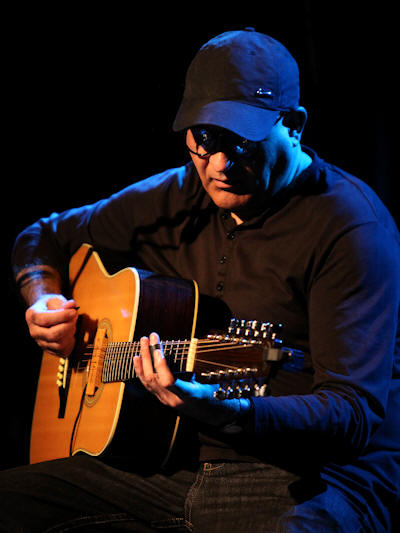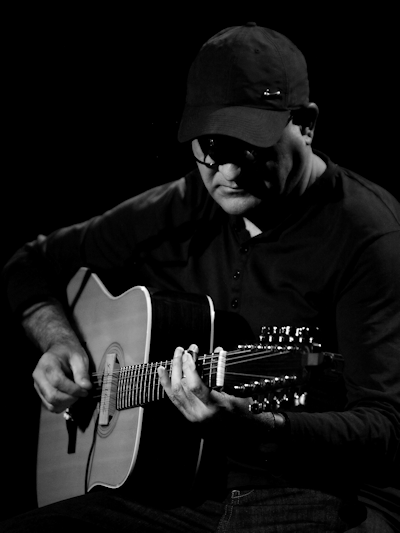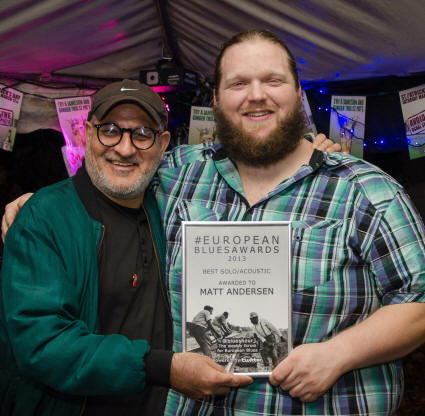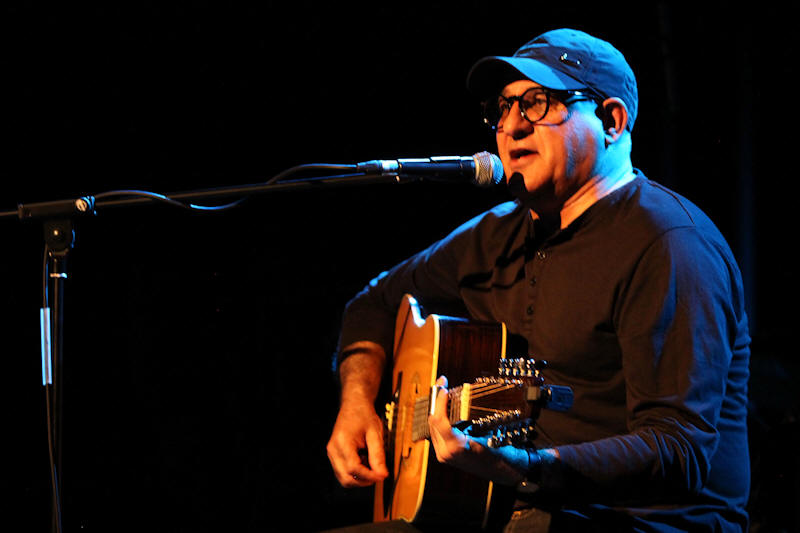|
I caught up with
circuit veteran Bluesman Mike Francis at The Waterside Arts
Centre, Sale, Cheshire where he was supporting his friend
Larry Miller on tour.
Alan: Where
do you originate from and what were your first musical
memories?
Mike:
I'm originally from the
Midlands, although I'm based further north now. I grew up
around the Midlands and my first professional playing in the
70s was overseas, I did some gigs in this country and then
quickly started touring and working overseas, picking up
stuff like soul tours in Europe. I'm really from the
Midlands but these days I base myself out of Liverpool.
Alan: Did
you come from a musical family?
Mike: I
suppose there was influence there from my grandfather. I
remember as a boy there being music in the house, influences
and things, I remember the excitement of the new charts
coming out and running down the street to listen to that.
In the days when we bought vinyl records.
 Alan:
Did you always want to become a musician and how did
you get started in music? Alan:
Did you always want to become a musician and how did
you get started in music?
Mike: Yes, I
think I collected guitar catalogues; I was always fascinated
by guitars and I've been with guitars all my life. That's
where the interest started. I started playing when I was
about 10 or 11, when I first attempted to play then I got
proper assistance from a friend of mine and took it from
there and that developed eventually into what I'm doing now.
Alan: What
kind of material were you playing in the early days?
Mike: I
suppose really it was whatever was put in front of us.
There were a lot of American influences, a lot of things
that we heard through the radio, late night radio, listening
to chart shows and then more traditional music, a lot of
acoustic stuff, a lot of American protest stuff. Acoustic
music always fascinated me, acoustic music always has,
probably more so in later times. I guess like everybody
else I got into the early Kinks, Hollies, those kind of
bands but there was a yearning to sound like a lot of the
black American soul singers. I was always very interested in
that and I liked to play those numbers as well. I always
enjoyed working with local people and playing instruments
together and trying to pretend we were a supergroup, that
was part of the fun.
Alan: What
first attracted you to the blues?
Mike: The
blues, I suppose it was early television influences. I
started watching stuff that had come from the States and
obviously there was quite a connection with bands like the
Stones and what they were doing, so I kind of put the two
together and found it interesting to go off on my own and
play really early blues picks. I used to collect records
that had that on them and I would spend hours copying
how they did their fingerpicking and their style and even
in those days although I didn't play bottleneck until some
years later, the bottleneck blues was always really an
exciting sound. I picked it up in later times and really do
enjoy that, to me that's something very special.
Alan: Who
has influenced you most in your music writing and playing?
Mike: It's
difficult to say really. There's probably a lot of early
70s influence there because that became most active in my
playing so I suppose there would have been riffs and things
that you heard on radio although you didn't always know who
they were. I remember going round the fairgrounds with my
Dad and hearing incredibly loud distorted speakers which at
times sounded really good but looking back on it must've
been really awful. I remember things like The Turtles, The
Kinks and bands like that, probably very early Rock n'Roll
things with Bill Haley; my mother had these records and I
can remember listening to that as well. Obviously Elvis has
to come in there somewhere and
that generation
but once I got into more full-time playing, I took
it on more I found that the soul boom was there and the
black influence with that and I really enjoyed doing that.
There were some great days. There were a great
learning pad
for me with some really great artists.
Alan: What
guitars do you play and which is your favourite?
Mike: As I do
my own show now, I've gone back to what I was probably 10 or
20 years ago. I'm playing a lot of 12 string in the live shows
I'm doing now - I've just come back
from Croatia, doing some shows in Europe, a couple of dates
now with Larry Miller and some on my own. At the moment
I'm taking out two different string tunings on 12 string
guitar. I think Blind Willie McTell had his 12 string and
I'm sort of combining a bit of bottleneck with a bit of open
string as well. I'm using two 12 strings tonight so we'll
have a look at what that sounds like; beautiful sounds from
beautiful guitars,
Alan: Are
there any particular songs that you play that have any
special meaning to you?
Mike: Oh yes.
There's a whole load of things. There's some songs that I
play sometimes, haven't done them for a while but there are
songs by people like Tony T.S. McPhee, from his acoustic
phase, some of those types of song. At the moment I'm doing
a couple of almost tribute things to past legends, I'm doing
a song called 'Country Mile' by Rory Gallagher at the moment
which I'm enjoying very much. And also since the death of
Bobby Womack, I've been playing 'Don't Trust Me' as well. I
haven't done that as a solo song yet but I will do. I've
also started to play songs that are 20, even 30 years old
that I've written. I'm doing a song tonight that I think is
25 years old, we recorded on what was a cassette! I
recorded a cassette album 25 years ago as Mike Francis.
Alan: That
leads me to the 25 Colne Great British Rhythm & Blues
Festivals, of which I think you've performed or been
involved with 24 of them?
Mike: Yes,
I've had some connection with 24, whether it was involved
with it on a sort of a sponsorship or taking part basis or
just doing a little set down the road, I've been involved in
them for all those years. Oddly enough we sent a press
release for this out just before the event (see below) and
it was disconcerting that the press release didn't get used
because somebody came along and said he'd done it for 50
years. But if the festival has been going for 25 there
isn't really any possibility ... that's the artistic licence of
the blues!
Alan: How do
you think the Colne Festival has changed over the years?
Mike: It's
evolved. It's naturally got bigger. Bits of it I would
argue have got better. It's opened up a little bit. It
hasn't become a rock event as such but it's opened the
barriers a little bit but that can be quite healthy to bring
in new blood, as long as they keep the traditional touring
acts and bringing the old legends in from the States. They
keep booking me which is obviously very important and they
have an acoustic flavour, they use the Acoustic Stage well
and I hope that carries on.
 Alan:
Yes, the Acoustic Stage is always packed out. What do
you remember about the first Colne festival? Alan:
Yes, the Acoustic Stage is always packed out. What do
you remember about the first Colne festival?
Mike: Oh, very
clear. I remember it like it was yesterday. I've still got
the first programme somewhere. One of the main stages in
those days was Jim's Cafe in the original festival and I was
there. I've made a point of being in the cafe every year
except the year I didn't make it, either to play or to see
people. It was a very important part of it to me. I think
there was Dr Feelgood and Paul Jones with the Blues Band
that headlined. I managed to see those acts and I think the
hall wasn't laid out quite the same as it is now. The event
has got bigger and longer now.
Alan: You've
been in the blues music business for 38 years, has it
changed much over the years?
Mike: Quite a
lot. We've got all sorts of new sorts of things happening
now. The new publications, new methods of controlling the
way music is distributed and listened to, most of which I
find very interesting. I don't necessarily take part in all
of it, but I do find it interesting. I've tried to move
with the times but performance-wise I stick to a very
traditional way of doing things. I'd have to say that I
think the genre has to get mainstream to survive unless
we've got new blood coming in it's going to become a
baby-boom situation with just a lot of postwar people who
remember it coming up. New blood is coming in, there are
wonderful new performers that are under 18, there are a lot
of people who are being passed down from father to son which
is nice to see and it's getting some coverage again on the
TV, with the BBC 4 documentaries, some of the traditional
stuff. A lot of people like to know where the music they're
listening to now, such as at the Britpops, comes from. I
think that's very important.
Alan:
Over the time you've been in the business you must have had
some memorable moments.
Mike:
There's been quite a few of those. One that immediately
springs to mind is when I was touring Germany with the band
in the 70s doing these soul tours. We were in the truck and
we had these itineraries from the agent, we were bobbing
along and when we got to the venue it all seemed very quiet
and there were some ladies in there with chairs having a
Women's Meeting in the main hall. We looked at the
itinerary and we'd got the sheets the wrong way round and we
had half an hour left to get to virtually the other side of
Germany and play the proper show. In more recent times
there's been a few nice surprises. I was lucky enough to
get nominated last year for the European Blues Awards
because of some gigs that I did abroad and in Britain.
Alan:
You were nominated alongside Seasick Steve and Matt
Anderson.
Mike:
Yes, and ironically I do sometimes do shows with Matt
Anderson. We are friends and I've been following him and
been involved with that side for some years. I managed to
organise it with the people who had done the event that I
could actually present his award. That was lovely to be
able to see Matt again. These little things happen and it
was nice to get recognition that far down the line.
Hopefully long may it last!

Bluesman
Mike Francis with Matt Anderson
Alan:
Do you frequently tour Europe?
Mike:
I wouldn't say it was frequently, I've been over with the
Duo and I've done my solo stuff over there more recently, I
did some low key shows in Croatia a few weeks ago.
Alan:
How do the European shows compare with the British shows?
Mike:
It's quite different. I actually experimented by doing a
song in a different language recently, which was quite
amusing as it was a language I don't speak. It went down
very well, just for that reason probably. I think they are
more, being general, overall they are more willing to buy
products on the day, the whole merchandising thing, if I can
pack a case and put some CDs in, I'm probably going to sell
them. I've found that we get more orders through from
Europe and the States. I've got a new radio session coming
out that I'm quite excited about, which has got some good
new material in it. I don't record a lot these days.
The material side
of it, well basically, I wrote most of what became the
Sisters in Grease album when I was in Europe, it's a
festival partnership that we do as a duo. We released an
album and most of that I managed to pen in about a week and
find it a great clear-thinking experience. I feel that I'm
writing from the heart but I'm trying to write from natural
influence that comes quite often from the 30s and 40s. So
really, it's new material but it's almost been beamed in
from somewhere that sort of becomes the songs. They have
that traditional feel, that roots basis to them, and they've
not been copied necessarily from anything that I've directly
remembered or done, they are fresh influences. The song
that I'm talking about with the recording is actually called
Imelda May and I'll be playing it tonight. Some time ago,
obviously being involved with the festivals, we came across
Imelda May. It just happened to be some lyrics that came
into the song, so we decided to do it. But the nightmare we
had trying to make the video was beyond belief. There was a
mix up with the management and we tried to do it all
legitimately with passes and do the filming for a 30 second
spot in the video. It ended up taking up part of my life
that I'll never get back. And still it wasn't made but
never mind we are going to release the track anyway and
that'll come out on a radio session in the next couple of
weeks and we're looking forward to that.
Alan:
What are your future plans and projects?
Mike:
I intend to become more active next year, both in the UK and
further afield, as a solo entertainer, as Bluesman Mike
Francis. On Wikipedia, as a performer, as a guitar player
for many years I was Mike Francis but the problem came when
a very famous Italian singer called Mike Francis passed on a
couple of years ago and it didn't half do some damage to the
Google ratings. Going back to the point about technology
and links to the web, that's what really matters now. So
that caused a lot of problems. So I then ended up changing
to Bluesman Mike Francis and it kind of stuck. In Croatia,
they billed me as 'The Bluesman' with, in brackets
underneath, 'Mike Francis'. So it works somehow. But
that's what I'll now be known as for my remaining years,
however long they might be.
Alan:
It can be difficult, like my name, I often get mixed up
with Alan White, the Yes drummer!
Mike:
Yeah, it happens and that must be a big one with what you
do. So that's where we are, to get the session out and do
some stuff next year. I enjoy doing the festivals they are
all exciting, especially the indoor ones, these new
Weekenders, trips away, I get quite interested in those, I
get requests occasionally to do them. Obviously I have
other interests that I'm involved in, I co-promote the
Manchester Blues & Roots Festival that'll be running again
in the bi-anneal next year 2015. We are going to push
that quite hard this year, and this year it will go in with
part of a drama festival which I'm interested in as well.
Alan:
Thank you
Mike.

|